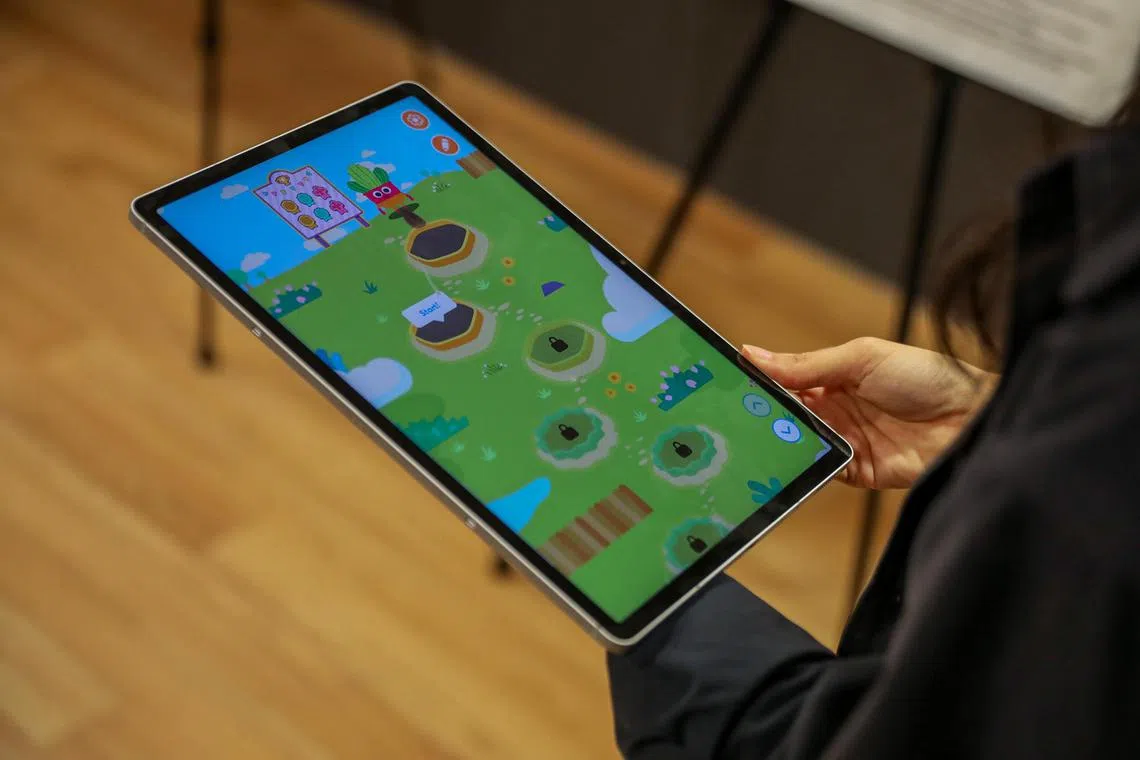New resources to help young children in Singapore protect themselves against sexual abuse
Sign up now: Get ST's newsletters delivered to your inbox

The resources include a mobile game, an e-learning course and videos to equip young children, parents, educators with knowledge on body safety.
ST PHOTO: LUTHER LAU
SINGAPORE - “Someone touched me, and it made me feel scared. What should I do?”
Should I: (a) scare the person; (b) ignore it, I’ll feel better later; or (c) tell someone I trust straight away?
A new video about body safety, among other resources to help children protect themselves against sexual abuse from an early age, hopes to provide them with the right response to such questions.
Targeted at children aged four to nine, the resources include a mobile game, an e-learning course and videos to equip the children, parents and educators with knowledge on body safety and protective behaviours.
The Garden of Safety Resource Kit was launched by family violence specialist centre Pave together with its community partners at the Singapore University of Social Sciences (SUSS) on Oct 16.
The resources will be rolled out to schools, pre-school centres and children’s homes in Singapore.
Dr Sudha Nair, executive director of Pave, said: “In close collaboration with our community and education partners, we hope to create a movement in Singapore where knowledge is a powerful tool in preventing any forms of abuse.”
An inaugural report on domestic violence trends by the Ministry of Social and Family Development (MSF) in September showed that the number of new Tier 1 child abuse cases, defined as those with low to moderate safety and risk concerns, rose 17 per cent from 2,377 in 2021 to 2,787 in 2023.
Meanwhile, the number of new Tier 2 child abuse cases, where children may have severe injuries such as burns or fractures inflicted on them, fell slightly from 2,141 in 2021 to 2,011 in 2023.
A study published in January found that younger victims of sexual abuse are more likely to take a longer time to report
The study found that it took an average of about two years and eight months from the first incident of abuse to the authorities being alerted.
The resource kit by Pave includes an e-learning module with six lessons on topics such as being and feeling safe, early warning signs and respecting boundaries.
Designed for pre-school educators, parents and caregivers of young children, the three-hour course includes curated video resources, quizzes and online peer discussions. It will be available from November on SUSS’ UniLearn platform, an e-learning initiative for the community.
The course fee is $5.45 for the first 4,000 learners and $10.90 after that.
On completing the course, educators and caregivers can access a new Protective Behaviours Curriculum and Manual that guides them in teaching children to protect themselves against sexual abuse.
The resource kit also includes a mobile game, Garden of Safety, launched in February to educate children on protective behaviours.
Developed by Pave and SUSS, the game teaches children how to respond when their safety is compromised. The free app is available for download on the Google Play Store.
Another part of the kit is a two-minute Garden of Safety animated video, launched in August 2023 to teach body safety rules and protective behaviours.
Pave has helped more than 37,000 clients move past abuse since it was set up in 1999.
One of them is Kelly (not her real name), who was nine when she was first physically abused by her mother and sexually abused by her stepfather. When Kelly finally summoned the courage to confide in her mother, she was dismissive.
By the age of 12, the molestation escalated to rape. During a sex education class in school, she asked a question about molestation but still did not report her case. She started self-harming.
Eventually, Kelly confided in her teacher. This led to the involvement of the police and Child Protection Service.
Speaking to the media, Kelly, now 33, who went through counselling and group therapy, said: “It’s important that you come out of it stronger and not repeat the generational cycle of abuse.”
The workplace safety professional, who is married with two young children, added: “The most important thing is for your child to know you’ll believe them if they come to you. Don’t worry about what’s to come. Just make the report and know that there’s a lot of people who are willing to help.
“So the important thing to do is to first remove yourself from the toxic environment, and then seek help for your own recovery.”
Another survivor, Daisy (not her real name), witnessed her elder brother molesting her younger sister. She and her siblings also endured years of physical abuse from their father, including stomping, whipping and having hot water poured on them.
Daisy’s mother guilt-tripped her into not reporting the abuse, fearing backlash from her husband and son. The family called the police after a violent episode in October 2023, and was linked up with Pave.
The family got a protection order against the father. Pave also supported the victim in filing a police report against her brother, and the case is currently under investigation.
Daisy, now 26 and working as a pre-school teacher, said: “If you see someone who is a victim of abuse, please don’t stay quiet, and please reach out to someone. Because when you stay quiet, the abuse wouldn’t end and other people might become a victim too.”


